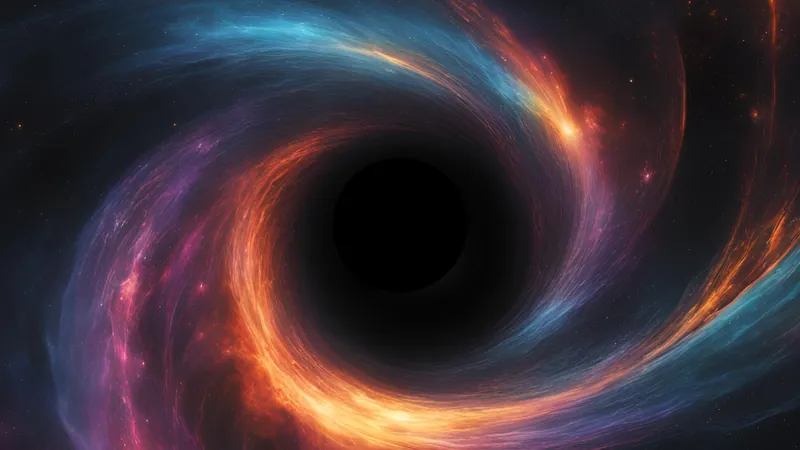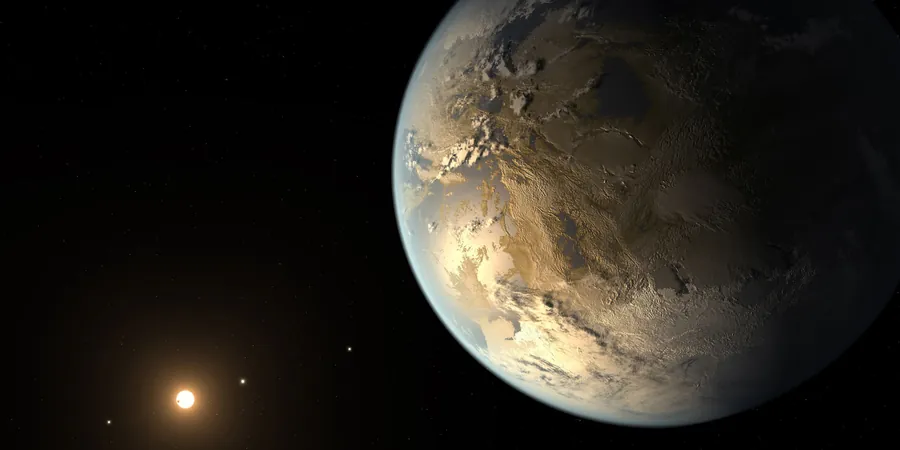
Groundbreaking Study Links Black Holes to Dark Energy, Unraveling Cosmic Mysteries!
2024-11-02
Author: Wei Ling
Introduction
In a stunning development, scientists have strengthened the intriguing connection between black holes and the enigmatic phenomenon known as dark energy. Recent research proposes that the formation of numerous black holes during what has been dubbed 'reverse Big Bang replays' may explain the increasing dominance of dark energy in our ever-expanding universe.
Understanding Dark Energy
Dark energy is a placeholder term for the mysterious force driving the accelerated expansion of the universe, a phenomenon that accounts for about 70% of the cosmic energy budget. Its origins and nature remain a profound mystery to scientists. Before the emergence of dark energy around 5 billion years ago, gravity and matter prevailed, reigning in the universe’s expansion shortly after the Big Bang. However, the transition to a dark energy-dominated era has left scientists pondering how such a significant shift occurred.
Research Findings
The research team, led by Professor Gregory Tarlé from the University of Michigan, sought to pinpoint where in today's universe the force of gravity parallels that of the universe's infancy. Their conclusion: only at the core of black holes. This led them to theorize that black holes could be 'cosmically coupled' to dark energy.
The Hypothesis
According to Tarlé, 'The hypothesis suggests that black holes are linked to the expanding universe and filled with dark energy that grows as the cosmos expands.' This groundbreaking idea hints that the process of black hole formation mirrors a reverse Big Bang, where the ingestion of matter by black holes could result in the conversion of matter into dark energy.
Implications of the Theory
The implications of this theory are staggering. If black holes indeed harbor dark energy, they may be influencing the universe’s accelerating expansion. While the researchers have yet to decipher the intricate details of this coupling process, the evidence they have gathered points to a significant connection worth further exploration.
Building on Previous Research
This new research builds on previous work from February 2024, which examined how the expanding universe affects the growth of supermassive black holes. Tarlé noted, 'If all black holes grew in this cosmologically coupled way, they could collectively account for the density of dark energy present in today’s universe.'
Data Collection Using DESI
For their current investigation, the team utilized data from the Dark Energy Spectroscopic Instrument (DESI), a powerful tool comprising 5,000 robotic cameras mounted on the Mayall telescope at Kitt Peak National Observatory. DESI's ambitious mission involves mapping the cosmos and probing the properties of dark energy across vast distances, revealing essential insights into how it may be evolving.
Findings from DESI
The findings from DESI's first year of data have already suggested that the density of dark energy is not uniform as previously assumed, marking a paradigm shift in how scientists understand this cosmic force. Tarlé remarked, 'This coupling theory provides a possible physical mechanism for the changing density of dark energy.'
Correlation Between Black Holes and Dark Energy
By correlating changes in dark energy density with the birth of black holes—an ancient process following the deaths of massive stars—the team demonstrated that the emergence of black holes aligns with fluctuations in dark energy levels, supporting their hypothesis.
Looking Ahead
While the researchers are not yet equipped to fully understand the interplay between dark energy and dark matter, Tarlé speculated, 'In the early universe, strong gravitational forces triggered a type of dark energy that caused rapid inflation until it transformed into the matter we observe today. It is possible that black holes could serve a similar transformative role in reverse.'
Revolutionizing Black Hole Physics
One of the most revolutionary aspects of this theory is its potential to redefine our understanding of black holes. Traditionally, black holes were thought to contain singularities—points where physical laws collapse. However, Tarlé's model could eliminate the need for singularities, addressing a long-standing issue in black hole physics that has puzzled researchers for decades.
Future Research Directions
The journey does not end here. Tarlé and his team plan to follow up on their findings with additional data from DESI expected in the coming months and to explore various avenues of research that could further clarify the nature of black holes and their connection to dark energy.
Conclusion
As this research evolves, it transforms from a purely theoretical investigation into an experimental inquiry, igniting excitement in the scientific community. The link between black holes and dark energy may just hold the key to unlocking some of the universe's biggest mysteries! Keep an eye on this groundbreaking work as more revelations are anticipated soon!





 Brasil (PT)
Brasil (PT)
 Canada (EN)
Canada (EN)
 Chile (ES)
Chile (ES)
 España (ES)
España (ES)
 France (FR)
France (FR)
 Hong Kong (EN)
Hong Kong (EN)
 Italia (IT)
Italia (IT)
 日本 (JA)
日本 (JA)
 Magyarország (HU)
Magyarország (HU)
 Norge (NO)
Norge (NO)
 Polska (PL)
Polska (PL)
 Schweiz (DE)
Schweiz (DE)
 Singapore (EN)
Singapore (EN)
 Sverige (SV)
Sverige (SV)
 Suomi (FI)
Suomi (FI)
 Türkiye (TR)
Türkiye (TR)